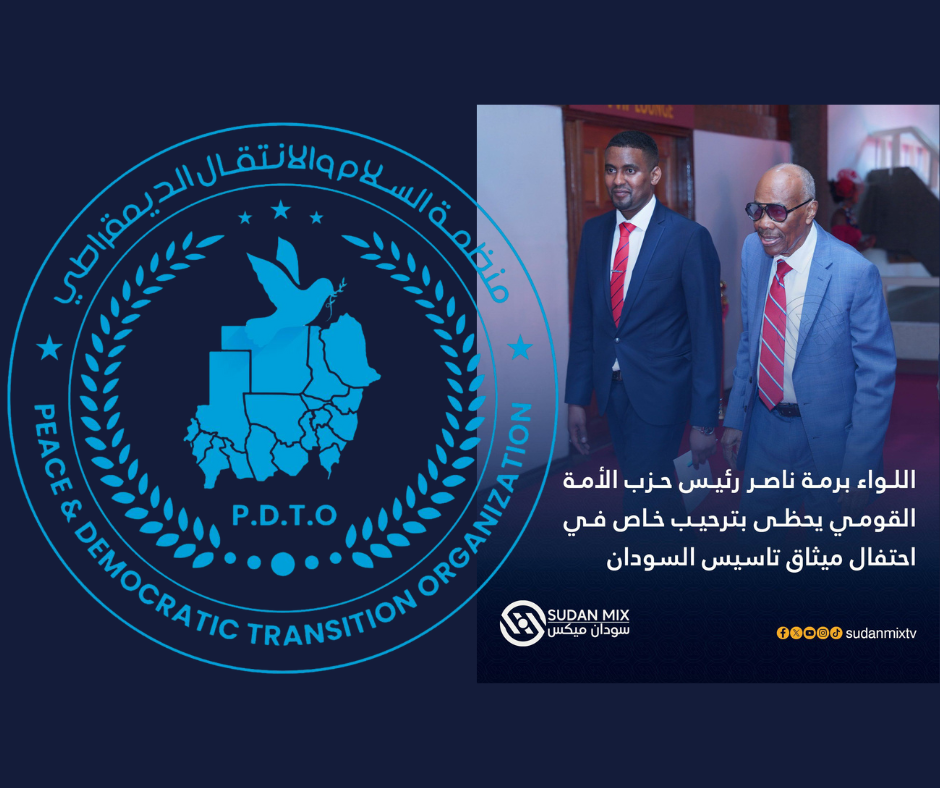News
News
Latest Updates
PDTO Statement on Civilian Protection Amid Sudan Crisis
On behalf of its regional partners and member organizations, the Peace & Democratic Transition Organization (PDTO) expresses deep concern over the escalating humanitarian crisis in Sudan. The recent outbreak of armed conflict has led to mass displacement, systematic human rights violations, and deliberate attacks on civilian infrastructure.
PDTO urgently calls on international bodies, humanitarian agencies, and regional stakeholders to prioritize the protection of civilians, ensure immediate and unhindered humanitarian access, and initiate comprehensive documentation to support future justice and accountability processes.
Through collaborative response mechanisms and unwavering solidarity with the Sudanese people, PDTO remains steadfast in its mission to uphold human dignity, amplify marginalized voices, and promote lasting peace grounded in democratic values and justice.
Issued: April 2025
News Blogs

Sudan’s Transitional Peace Government Takes Shape: Peace Organization Welcomes TASIS Presidential Council & Prime Minister, Calls for Justice‑Centred Reconstruction
Sudan’s Transitional Peace Government Takes Shape: Peace Organization Welcomes TASIS Presidential Council & Prime Minister, Calls for Justice‑Centred Reconstruction
Brussels, 27 July 2025 — At a decisive moment in Sudan’s modern history, the Peace Organization (Organisation pour la Paix) salutes the formal entry into function of the Transitional Peace Government, following the decisions announced by the Leadership Council of the Sudan Founding Alliance (TASIS). This crucial step — which includes the formation of a 15‑member Presidential Council and the selection of Mr. Mohamed Hassan Othman Al‑Ta’ayshi as Prime Minister — signals a long‑awaited break with decades of authoritarianism, militia rule, and institutional collapse.
Far more than a rearrangement of power, this transition represents a call for a new social contract — one that honours the sacrifices of millions of Sudanese who demanded a secular, federal, democratic Sudan grounded in justice, peace, liberty, and citizenship.
What TASIS Decided — And Why It Matters
During its second session on 24 July 2025, and after calm, objective deliberations, the Leadership Council of TASIS announced:
The formation of the Presidential Council, in accordance with Article 267 of the Transitional Constitution of the Republic of Sudan, 2025, composed of fifteen (15) members, including the regional governors who will, by virtue of their positions, act as deputies to the President of the Council for their respective regions.
The selection of Mr. Mohamed Hassan Othman Al‑Ta’ayshi as Prime Minister, pursuant to Article 71(1)(a) of the same Constitution.
These decisions do not resolve Sudan’s crisis overnight — but they provide institutional architecture to begin doing so: a transitional executive with distributed regional responsibilities, and a prime minister mandated to steer the State through peace, reform, and national reconstruction.
Full List of the Presidential Council Members (as announced by TASIS)
Commander Mohamed Hamdan Dagalo — President
Commander Abdalaziz Adam Alhilu — Vice President
Altahir Abubakr Hagar — Member
Mohamed Yousif Ahmed Almustafa — Member
Hamid Hamdeen Al‑Nuwairi — Member
Abdalla Ibrahim Abbas — Member
Kholdi Fathi Salim — Member
Elhadi Idris Yahya — Governor of Darfur Region — Member
Jagood Mukwar Marada — Governor of South Kordofan / Nuba Mountains Region — Member
Joseph Tuka Ali — Governor of the newly established Fung Region — Member
Saleh Issa Abdullah — Governor of the Central Region — Member
Mabrouk Mubarak Salim — Governor of the Eastern Region — Member
Abulgasim Al‑Rasheed Ahmed Al‑Hassan — Governor of the Northern Region — Member
Faris Al‑Nour Ibrahim — Governor of Khartoum — Member
Hamad Mohamed Hamid Khalifa — Governor of Kordofan Region — Member
Prime Minister: Mohamed Hassan Othman Al‑Ta’ayshi
Peace Organization’s Position: A Moment of Hope — and Responsibility
“This transition is not a destination but a starting line. The Sudanese people have endured immeasurable suffering — war, displacement, famine, gender‑based violence, and the systematic destruction of civic life. Any roadmap forward must place justice, accountability, and the dignity of victims at its core.”
— Peace Organization, Brussels, 27 July 2025
We extend our warmest congratulations to the Transitional Peace Government and call for an immediate, inclusive agenda that prioritises:
A comprehensive ceasefire and the protection of civilians across all regions;
Humanitarian corridors monitored by independent mechanisms to ensure aid reaches the most vulnerable;
Transitional justice: truth‑telling, prosecution of atrocity crimes, reparations, and guarantees of non‑recurrence;
Security Sector Reform (SSR) and DDR (Disarmament, Demobilisation, Reintegration) to dismantle parallel armed economies;
Federal decentralisation that respects regional autonomy while preserving national unity;
A secular, rights‑based Constitution built through a credible, participatory process;
Women’s and youth inclusion at all levels of governance and decision‑making;
Economic stabilisation, anti‑corruption measures, and recovery programmes for war‑torn communities;
Institutional rebuilding of the judiciary, civil service, and oversight bodies;
Reintegration of the diaspora as a force for expertise, investment, advocacy, and reconciliation.
Legal & International Grounding
This transitional moment must be moored to international law and binding obligations:
Responsibility to Protect (R2P): When states fail to protect populations from mass atrocities, the international community must act — diplomatically, legally, and collectively.
International Humanitarian Law (IHL): All parties must respect distinction, proportionality, and the protection of civilians and medical facilities.
Counter‑terrorism frameworks: Groups and networks that systematically target civilians must face legal designation, financial isolation, and prosecution.
Universal jurisdiction & hybrid tribunals: Grave crimes must be prosecuted — no safe havens, no impunity.
ICJ/ICC mechanisms: States and regional bodies should leverage existing treaty frameworks to seek advisory opinions, impose provisional measures, and support criminal accountability efforts.
From War to Reconstruction: Five Immediate “First 100 Days” Benchmarks
Nationwide humanitarian ceasefire with verifiable monitoring.
Emergency National Humanitarian Plan jointly coordinated with UN, AU, IGAD and key NGOs, with independent oversight.
Launch of a Transitional Justice Commission with survivor‑centred mandates, gender parity, and investigative powers.
Publication of a Stabilisation & Economic Recovery Blueprint: currency stabilisation, corruption oversight, and war‑economy dismantlement.
Constitution‑Making Roadmap with real inclusion of regions, women, youth, IDPs/refugees, and diaspora communities.
Message to the International Community
We urge the European Union, African Union, IGAD, the Arab League, the United Nations, and bilateral partners to:
Provide technical and financial support for constitutional reform, institution‑building, and justice processes;
Expand targeted sanctions against individuals, militias, financiers, and disinformation networks obstructing peace;
Safeguard human rights defenders, journalists, and civil society from reprisals;
Assist in the creation of hybrid judicial mechanisms to prosecute atrocity crimes;
Recognise the Transitional Peace Government while insisting on transparency, inclusion, and accountability as conditions for long‑term international support.
Continuity of Struggle, Certainty of Victory
Echoing the TASIS communiqué, we recognise: “The struggle continues, and victory is certain.”
That victory, however, will only be meaningful if it centres victims, dismantles impunity, and rebuilds Sudan as a free, just, equal, and democratic homeland — secular, decentralised, and voluntarily unified.
About the Peace Organization & ICHR
The Peace Organization (Organisation pour la Paix) is an independent Sudanese human rights and peacebuilding body committed to justice, democratic transition, and the protection of civilians.
ICHR – International Coalition for Human Rights (https://ichr-international.org/) is a global platform that publishes human rights news, legal analyses, and advocacy content — beyond the news of the international coalition itself — amplifying causes that defend human dignity and the rule of law worldwide.
Media Contacts
Peace Organization
Brussels, Belgium
📧 [email protected]
ICHR – International Coalition for Human Rights
🌐 https://ichr-international.org/
FRANÇAIS
Le Gouvernement de Transition pour la Paix prend forme au Soudan : l’Organisation pour la Paix salue le Conseil présidentiel de la TASIS et le Premier ministre, et appelle à une reconstruction fondée sur la justice
Bruxelles, le 27 juillet 2025 — À un moment charnière de l’histoire contemporaine du Soudan, l’Organisation pour la Paix salue l’entrée en fonction du Gouvernement de Transition pour la Paix, à la suite des décisions rendues publiques par le Conseil de direction de l’Alliance Fondatrice du Soudan (TASIS). Cette étape majeure — comprenant la formation d’un Conseil présidentiel de 15 membres et la désignation de M. Mohamed Hassan Othman Al‑Ta’ayshi au poste de Premier ministre — marque une rupture attendue avec des décennies d’autoritarisme, de gouvernance militarisée et d’effondrement institutionnel.
Il ne s’agit pas d’un simple transfert de pouvoir, mais d’un appel à un nouveau contrat social, répondant au désir profond des Soudanaises et Soudanais d’édifier un Soudan laïc, fédéral, démocratique, fondé sur la justice, la paix, la liberté et la citoyenneté.
Les décisions de la TASIS — et leur portée
Au terme de sa deuxième session, le 24 juillet 2025, et à l’issue de délibérations calmes et objectives, le Conseil de direction de la TASIS a annoncé :
La formation du Conseil présidentiel, conformément à l’Article 267 de la Constitution de transition de la République du Soudan, 2025, composé de quinze (15) membres, incluant les gouverneurs des régions qui, de par leurs fonctions, agissent comme adjoints au Président du Conseil pour leurs régions respectives.
La désignation de M. Mohamed Hassan Othman Al‑Ta’ayshi en tant que Premier ministre, conformément à l’Article 71, paragraphe 1(a) de la même Constitution.
Ces décisions installent le cadre institutionnel minimal pour rouvrir la voie de la paix, de la réforme et de la reconstruction nationale.
Composition du Conseil présidentiel (telle qu’annoncée par la TASIS)
Commandant Mohamed Hamdan Dagalo — Président
Commandant Abdalaziz Adam Alhilu — Vice‑président
Altahir Abubakr Hagar — Membre
Mohamed Yousif Ahmed Almustafa — Membre
Hamid Hamdeen Al‑Nuwairi — Membre
Abdalla Ibrahim Abbas — Membre
Kholdi Fathi Salim — Membre
Elhadi Idris Yahya — Gouverneur de la Région du Darfour — Membre
Jagood Mukwar Marada — Gouverneur du Sud‑Kordofan / Monts Nouba — Membre
Joseph Tuka Ali — Gouverneur de la nouvelle Région du Fung — Membre
Saleh Issa Abdullah — Gouverneur de la Région Centrale — Membre
Mabrouk Mubarak Salim — Gouverneur de la Région Orientale — Membre
Abulgasim Al‑Rasheed Ahmed Al‑Hassan — Gouverneur de la Région du Nord — Membre
Faris Al‑Nour Ibrahim — Gouverneur de Khartoum — Membre
Hamad Mohamed Hamid Khalifa — Gouverneur de la Région du Kordofan — Membre
Premier ministre : Mohamed Hassan Othman Al‑Ta’ayshi
Position de l’Organisation pour la Paix : l’espérance et la responsabilité
« Cette transition n’est pas une fin, mais un commencement. Le peuple soudanais a payé un prix incommensurable — guerres, déplacements, famine, violences basées sur le genre, destruction de la vie civique. Toute feuille de route crédible doit placer la justice, les droits des victimes et la fin de l’impunité au centre. »
— Organisation pour la Paix, Bruxelles, 27 juillet 2025
Nous adressons nos félicitations au Gouvernement de Transition et appelons à une agenda immédiat, inclusif et rigoureux qui priorise :
Un cessez‑le‑feu global et la protection des civils dans toutes les régions ;
Des corridors humanitaires surveillés par des mécanismes indépendants garantissant l’accès de l’aide aux plus vulnérables ;
La justice transitionnelle : vérité, poursuites des crimes, réparations, garanties de non‑répétition ;
La réforme du secteur de la sécurité (RSS) et le DDRR pour démanteler les économies armées parallèles ;
La décentralisation fédérale respectant l’autonomie régionale sans briser l’unité nationale ;
Une Constitution laïque et fondée sur les droits élaborée via un processus véritablement participatif ;
L’inclusion des femmes et des jeunes à tous les niveaux de gouvernance ;
La stabilisation économique, la lutte anti‑corruption, et la relance des communautés dévastées par la guerre ;
La reconstruction des institutions publiques : justice, administration, organes de contrôle ;
La mobilisation de la diaspora comme force d’expertise, d’investissement, de plaidoyer et de réconciliation.
Ancrage juridique et international
Cette transition doit s’appuyer sur les normes du droit international :
Responsabilité de protéger (R2P) : lorsque l’État échoue, la communauté internationale doit agir.
Droit international humanitaire (DIH) : respect strict de la protection des civils et des infrastructures médicales.
Lutte contre le terrorisme : les réseaux ciblant les civils doivent être désignés, sanctionnés et poursuivis.
Compétence universelle & mécanismes hybrides : aucune impunité pour les crimes graves.
CIJ / CPI : recours aux instruments conventionnels pour obtenir avis consultatifs, mesures conservatoires et appuyer les poursuites pénales.
Cinq jalons prioritaires (les “100 premiers jours”)
Cessez‑le‑feu humanitaire national avec mécanisme de vérification.
Plan humanitaire d’urgence co‑coordonné avec l’ONU, l’UA, l’IGAD et des ONG, sous contrôle indépendant.
Commission de justice transitionnelle dotée de pouvoirs d’enquête, centrée sur les victimes, avec parité de genre.
Feuille de route économique : stabilisation monétaire, transparence budgétaire, démantèlement de l’économie de guerre.
Processus constituant inclusif impliquant régions, femmes, jeunes, déplacés/réfugiés et diaspora.
Message à la communauté internationale
Nous demandons à l’Union européenne, l’Union africaine, l’IGAD, la Ligue arabe, l’ONU et aux partenaires bilatéraux de :
Soutenir techniquement et financièrement les réformes constitutionnelles, l’édification institutionnelle et les mécanismes de justice ;
Étendre les sanctions ciblées contre les responsables, milices, financiers et appareils de propagande ;
Protéger les défenseurs des droits humains, journalistes et acteurs de la société civile ;
Aider à mettre en place des juridictions hybrides pour juger les crimes graves ;
Reconnaître le Gouvernement de Transition pour la Paix tout en conditionnant l’appui international à la transparence, l’inclusion et l’imputabilité.
La lutte continue, la victoire est certaine
En écho au communiqué de la TASIS : « La lutte continue, et la victoire est certaine. »
Cette victoire n’aura de sens que si elle place les victimes au centre, détruit l’impunité, et reconstruit un Soudan libre, juste, égalitaire et démocratique — laïc, décentralisé et uni volontairement.
À propos de l’Organisation pour la Paix & de l’ICHR
L’Organisation pour la Paix est un organisme soudanais indépendant œuvrant pour la justice, la transition démocratique et la protection des civils.
L’ICHR – International Coalition for Human Rights (https://ichr-international.org/) est une plateforme mondiale de publication d’actualités, d’analyses juridiques et de plaidoyer — au‑delà des seules actualités de la coalition internationale — pour défendre la dignité humaine et l’état de droit à travers le monde.
Contacts presse
Organisation pour la Paix
Bruxelles, Belgique
📧 [email protected]
ICHR – International Coalition for Human Rights
🌐 https://ichr-international.org/

Sudan’s Islamist Army: A New Threat to the Region
Sudan is rapidly evolving beyond a battlefield — it’s becoming a terror hub. The article warns that the growing influence of Sudan’s Islamist army, along with ISIS and other extremist factions, now poses a direct threat to Israel, especially near the southern border and vital Red Sea shipping lanes

New Breaking News: UN Warns of Further Clashes Between Sudan & South Sudan
The UN is raising alarms over renewed skirmishes at the Sudan–South Sudan border, particularly around the contested area of Jau. This marks a significant intensification in conflict after recent airstrikes by Khartoum forces in the region
The deterioration has prompted discussions of targeted United Nations sanctions aimed at curbing future escalations

Global Displacement Surges Amid Ongoing Wars
According to a new UNHCR report, by the end of April 2025 there were over 122 million people displaced globally—an increase of more than 2 million in just one year. With conflicts raging in Ukraine, Sudan, Gaza, and elsewhere, the rising toll is exacerbated by declining humanitarian funding and access